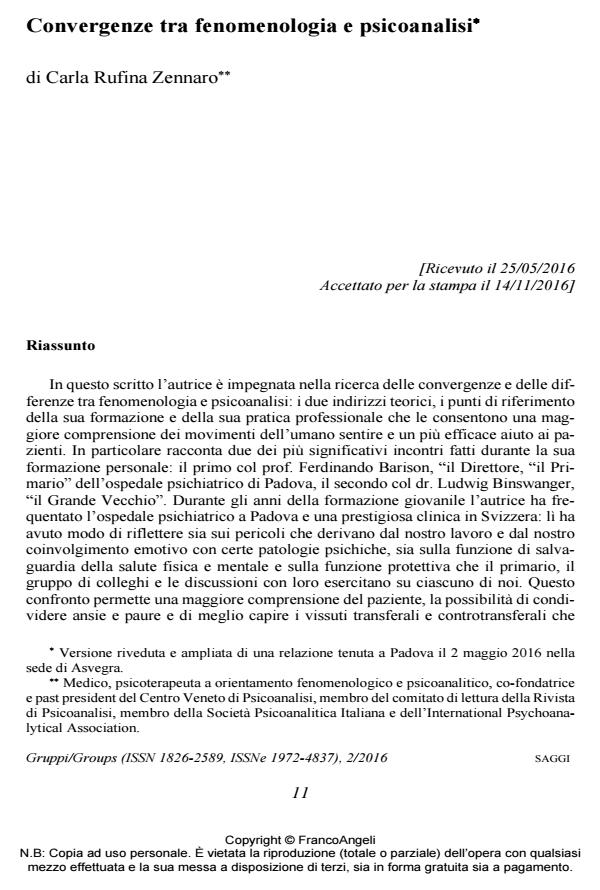Convergences between phenomenology and psychoanalysis
Journal title GRUPPI
Author/s Carla Rufina Zennaro
Publishing Year 2017 Issue 2016/2
Language Italian Pages 15 P. 11-25 File size 181 KB
DOI 10.3280/GRU2016-002002
DOI is like a bar code for intellectual property: to have more infomation
click here
Below, you can see the article first page
If you want to buy this article in PDF format, you can do it, following the instructions to buy download credits

FrancoAngeli is member of Publishers International Linking Association, Inc (PILA), a not-for-profit association which run the CrossRef service enabling links to and from online scholarly content.
The author explores convergences and differences between phenomenology and psychoanalysis, two theoretical approaches which became the cornerstones of her training and professional practice. More specifically, she recalls her meetings with two of the most significant personalities she got to know during the years of her training: Ferdinando Barison, "Director" of the Padua psychiatric hospital and Ludwig Binswanger, the "Grand Old Man", medical director of a prestigious clinic in Switzerland. Through those meetings she was led to reflect both on the dangers deriving from our work and our emotional involvement when dealing with specific psychic pathologies and on the safeguarding function (for our physical and mental health) as well as the protective function that the chief doctor, the group of colleagues and clinical team discussions exert upon us. The author maintains that the main point of convergence between psychoanalysis and phenomenology lies in an attitude of openness towards the Other, which implies both intrapsychic and intersubjective involvement. From the very first meeting onwards, transference and countertransference movements develop between patient and therapist whereby the two members of the dyad experience new forms of human exchange: together, they give birth to something completely new which stems from their own subjectivity. There is one fundamental, yet only doctrinal difference between these two theoretical approaches: phenomenology rejects metapsychology as an unnecessary superstructure when encountering the patient, when trying to understand him. On the contrary, psychoanalysis believes that metapsychology guarantees holding to the therapist’s thoughts and emotions, in this way preventing the therapist from sinking into the patient’s abyss. However, there lies a risk that metapsychology might be used defensively to seek refuge in the theory without listening to the affects.
Keywords: Psychoanalysis, Phenomenology, Severe pathologies, Protective func-tion of the working group, Encounter with the other, Clinical psychopathology
- Balint M. (1957). Medico, paziente e malattia. Milano: Feltrinelli, 1961.
- Barison F. (1985). Comprendere lo schizofrenico. Psichiatria Generale e dell’Età Evolutiva, 2004, 41, 2: 161-199.
- Benedetti G. (1992). La psicoterapia come sfida esistenziale. Milano: Raffaello Cortina, 1997.
- Binswanger L. (1941). Sprache, Liebe und Bildung. Confinia Psychiatrica, 1959, 2: 133-148.
- Binswanger L. (1956): Tre forme di esistenza mancata. Milano: Il Saggiatore, 1964.
- Boss M. (1957). Psicoanalisi e analitica esistenziale. Roma: Astrolabio, 1973.
- Buber M. (1954-1956). Il principio dialogico. Milano: Edizioni di Comunità, 1959.
- Eissler K.R. (1965). Ortodossia medica e futuro della psicoanalisi. Roma: Armando Editore, 1979.
- Epstein R.S. (1994): Epstein e la mente esperienziale. Milano: Springer Verlag.
- Fichtner G., a cura di (1992). Sigmund Freud, Ludwig Binswanger. Briefwechsel,1908-1938. Frankfurt\M: Fischer Verlag, 1992.
- Gozzetti G. (1996). La tristezza vitale. Psicopatologia e fenomenologia. Venezia: Marsilio.
- Gozzetti G. (2004) “Editoriale”. Psichiatria Generale e dell’Età Evolutiva, 2: 119-121.
- Heidegger M. (1927). Essere e tempo. Milano: Longanesi, 1970.
- Heidegger M. (1987). Seminari di Zollikon. Napoli: Guida, 2000.
- Kind J. (1992). Suizidal. Göttingen: Vandenhoek & Ruprecht, 1992.
- Levi P. (1986). I sommersi e i salvati. Torino: Einaudi.
- Lévinas E. (1985). Violenza del volto. Brescia: Morcelliana, 2010.
- Lévinas E (1991). Tra Noi. Saggi sul pensare-all’Altro. Milano: Jaca Book, 2002.
- Loewenstein R.M. (1958). Remarks on Some Variations in Psycho-Analytic Technique. The International Journal of Psychoanalysis, 39: 202-210.
- Nietzsche F. (1878). Menschliches, Allzumenchliches. Der Wanderer und sein Schatten, 55, Gefahr der Sprache für die geistige Freiheit. Berlin/New York: Verlag de Gruyter, 1988.
- Nietzsche F. (1883-1885). Così parlò Zarathustra. Milano: Mursia, 1965.
- Ogden T.H. (1994). Subjects of Analysis. London: Karnac Books.
- Ogden T.H. (2005). This Art of psychoanalysis. London and New York: Routledge.
- Poincaré H. (1908). Scienza e metodo. Torino: Einaudi, 1997.
- Saraval A. (1988). La tecnica classica e la sua evoluzione. In: Trattato di psicoanalisi. Teoria e tecnica. Vol. 1. Milano: Raffaello Cortina.
- Searles H.F. (1965). Scritti sulla schizofrenia. Torino: Boringhieri, 1974.
- Tamaro S. (2013). Ogni Angelo è tremendo. Milano: Bompiani.
- Zennaro C.R. (1997). Recensione su “La tristezza vitale. Psicopatologia e fenomenologia della melanconia” di Gozzetti G. Rivista di Psicoanalisi, 43, 3: 468-473.
Carla Rufina Zennaro, Convergenze tra fenomenologia e psicoanalisi in "GRUPPI" 2/2016, pp 11-25, DOI: 10.3280/GRU2016-002002